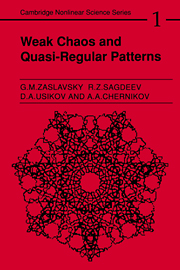1 - Hamiltonian dynamics
Published online by Cambridge University Press: 29 October 2009
Summary
The equations of motion in classical physics differ considerably depending upon the subject they describe: a particle, an electromagnetic field, or a fluid. However our natural yearning for unification in the description of different phenomena has long since led to the development of universal formalisms. Among these the Lagrangian and Hamiltonian formalisms are the most advanced. This can be explained by the nature of the phenomena discussed. The popularity of each method varied at different stages in the development of physics. Throughout the whole period of advancement of relativistically invariant theories, preference was chiefly given to Lagrangian formalism (this was most conspicuous in field theory and the theory of a continuous medium). To a large extent, it was not before the generalization of the concepts of Hamiltonian formalism and introduction of Poisson's brackets that the Hamiltonian method of analysis was able to compete with the Lagrangian one.
The formation of new ideas and possibilities triggered recently by the discovery of the phenomenon of dynamic stochasticity (or simply, chaos) have brought the methods of Hamiltonian dynamics to the fore. Liouville's theorems on the conservation of phase volume and on the integrability of systems with a complete set of integrals of motion have determined both the formulation of many problems of dynamics and the methods of their study. The Hamiltonian method turned out to be of extreme importance for the theory of stability, which was advanced in this direction by Poincaré. Numerous subsequent studies have shown that Hamiltonian systems (i.e., systems which can be described by Hamiltonian equations of motion) demonstrate fundamental physical differences from other (non-Hamiltonian) systems. This chapter provides the most necessary information on Hamiltonian systems.
- Type
- Chapter
- Information
- Weak Chaos and Quasi-Regular Patterns , pp. 1 - 20Publisher: Cambridge University PressPrint publication year: 1991



